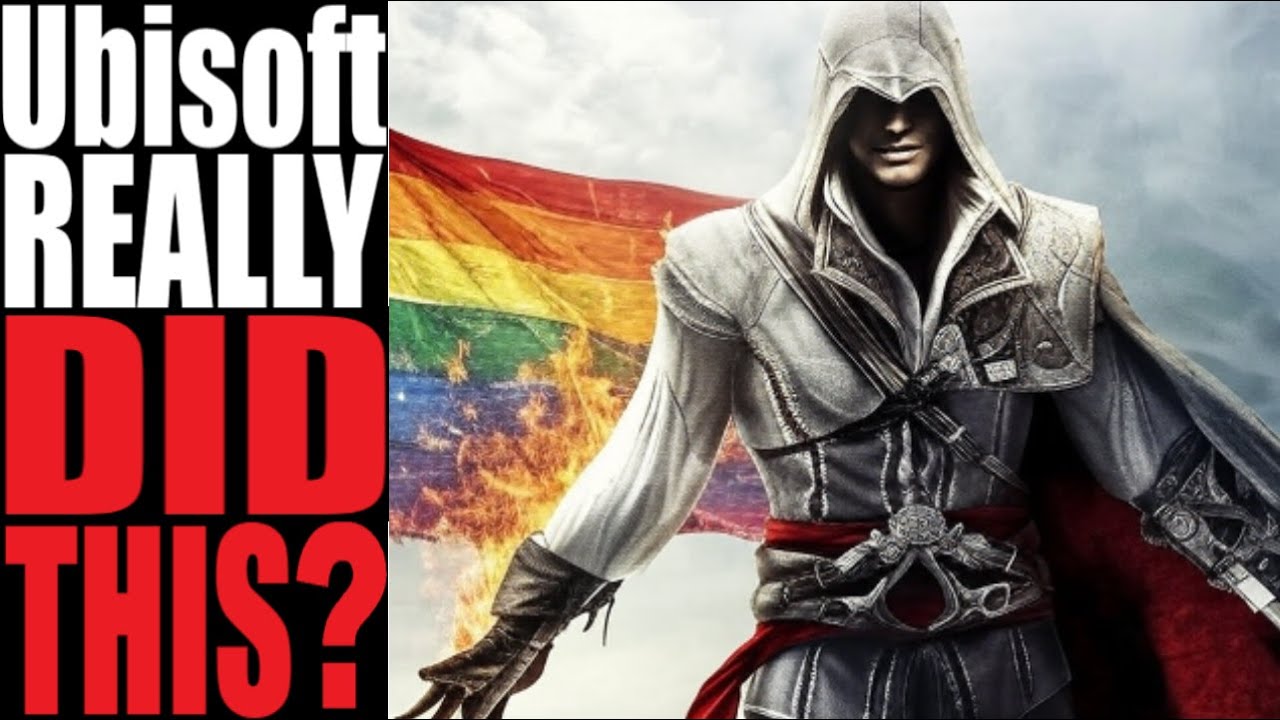Ubisoft’s Pride Month Pivot: A Cultural Shift or Strategic Retreat?
In a move that has sent shockwaves through the gaming community, Ubisoft, the French video game giant behind Assassin’s Creed and Far Cry, has reportedly chosen not to participate in Pride Month celebrations in June 2025, breaking from its tradition of vibrant rainbow-themed campaigns. Instead, the company has shifted its focus to promoting Men’s Mental Health Awareness Month, a decision that has sparked both praise and criticism. As posts on X light up with reactions—some hailing Ubisoft as “based” for prioritizing a less politicized cause, others accusing it of pandering to anti-woke sentiments—this pivot reflects a broader cultural shift in how corporations navigate social issues. With Ubisoft facing financial pressures and a turbulent year, what does this decision mean for the gaming industry and the ongoing “culture wars”?

Ubisoft’s Pride Month Legacy: A Colorful Past
Ubisoft has historically been a visible supporter of Pride Month, the annual June celebration of LGBTQ+ culture and rights that commemorates the 1969 Stonewall Uprising. In previous years, the company rolled out rainbow-themed social media logos, in-game cosmetics, and partnerships with organizations advocating for inclusivity. For instance, Ubisoft’s Rainbow Six Siege featured Pride-themed skins, and its corporate channels often shared messages of solidarity with the LGBTQ+ community. These efforts aligned with a broader trend among consumer brands, from Disney to Nike, which embraced Pride as a “branded holiday” with merchandise, events, and public statements.
However, Ubisoft’s 2025 approach marks a stark departure. Instead of rainbow avatars or Pride-themed content, the company issued a statement acknowledging June as Men’s Mental Health Awareness Month, emphasizing the importance of addressing mental health challenges faced by men, such as high suicide rates and societal pressures to suppress emotions. The announcement, shared across Ubisoft’s social media, included resources for mental health support and a call for open conversations about well-being. Notably absent was any mention of Pride Month, a silence that has fueled speculation about the company’s motives.
The Backdrop: A Corporate Retreat from Pride
Ubisoft’s decision comes amid a broader pullback from Pride Month by major corporations. In 2025, brands like Target, Meta, and Google have scaled back their Pride campaigns, citing concerns about backlash from right-wing consumers and potential reprisals from the Trump administration, which has taken a hardline stance against diversity, equity, and inclusion (DEI) initiatives. For example, Target has limited its Pride merchandise displays, while Nissan is reviewing its marketing spend, including Pride sponsorships. This shift began during the pandemic and accelerated with Trump’s second term, as companies faced boycotts and social media campaigns accusing them of “woke” overreach.
The gaming industry, in particular, has been a battleground for these cultural debates. Ubisoft itself has faced criticism over its handling of diversity in games like Assassin’s Creed Shadows, which stars Yasuke, a Black samurai, and Naoe, a female shinobi. Some X users labeled the game “historically inaccurate,” igniting a “mini culture war” that drew attention from figures like Elon Musk. Ubisoft’s sharp response to Musk, garnering over 440,000 likes, showcased its willingness to push back against detractors. Yet, the company’s decision to sidestep Pride Month suggests a more cautious approach to social issues in 2025.
Financial Pressures: A Strategic Move?
Ubisoft’s pivot cannot be separated from its financial struggles. In 2025, the company is navigating a precarious landscape, with stock prices fluctuating and a €1.16 billion investment from Tencent to bolster its Assassin’s Creed, Far Cry, and Rainbow Six franchises. The successful launch of Assassin’s Creed Shadows, which attracted 2 million players in its opening weekend, provided a much-needed boost, but Ubisoft remains under pressure to stabilize its finances. CEO Yves Guillemot has emphasized extending development timelines to ensure quality, signaling a focus on core business priorities over external controversies.
Some speculate that Ubisoft’s focus on Men’s Mental Health Awareness Month is a calculated move to appease a vocal segment of its fanbase, particularly male gamers who have expressed fatigue with “woke” corporate messaging. Posts on X reflect this sentiment, with users praising Ubisoft for addressing a cause they view as underserved. One user described the move as “incredibly based,” arguing that mental health is a universal issue that transcends political divides. However, others see it as a “Hail Mary” to deflect criticism from anti-woke activists while avoiding the financial risks of alienating progressive consumers.
Fan Reactions: A Divided Community
The gaming community’s response to Ubisoft’s decision is deeply polarized. On one hand, supporters argue that the focus on men’s mental health is a refreshing change, addressing a critical issue that affects millions. Men account for a disproportionate share of suicides globally, and societal expectations of stoicism often discourage them from seeking help. By highlighting this cause, Ubisoft is seen as taking a bold stand against the politicization of corporate activism, earning praise from those who believe companies should prioritize “neutral” issues.
On the other hand, critics view the move as a betrayal of Ubisoft’s previous commitment to inclusivity. The LGBTQ+ community, already facing heightened discrimination under policies like Trump’s threats to cut funding for transgender rights, sees the absence of Pride support as abandonment. Posts on X have accused Ubisoft of “going silent” to chase profits, with some suggesting the company is bowing to the same anti-woke pressure that led to Target’s scaled-back Pride displays. The timing—coinciding with World Pride 2025 preparations in Washington, D.C., which emphasize “hope” amid political challenges—amplifies the sense of disappointment among progressive fans.
The Culture Wars: Gaming as a Battleground
Ubisoft’s decision reflects the broader “culture wars” reshaping the gaming industry. Video games have become a lightning rod for debates about representation, with titles like The Last of Us Part II and Cyberpunk 2077 facing scrutiny over their handling of gender, race, and sexuality. Ubisoft has been at the center of these debates, particularly with Assassin’s Creed Shadows. The game’s diverse protagonists sparked accusations of “wokefication,” despite Yasuke’s historical basis as a samurai in 16th-century Japan. Ubisoft’s defense of the game, coupled with its viral clapback at Musk, demonstrated a willingness to engage in cultural debates—making its Pride Month silence all the more conspicuous.
The term “woke,” originally a call for social awareness, has become a pejorative in gaming discourse, used to criticize anything perceived as pandering to progressive ideals. Ubisoft’s shift to men’s mental health awareness may be an attempt to navigate this minefield, appealing to a broader audience while avoiding the lightning rod of Pride. However, this strategy risks alienating fans who valued the company’s previous inclusivity, particularly in games like Watch Dogs: Legion, which featured diverse casts and queer representation.
The Bigger Picture: Pride Month in 2025
Pride Month 2025 is unfolding against a complex backdrop. While parades and events continue globally—from Bangkok to West Hollywood—corporate support has waned. Some brands, like Vans, maintain Pride collections with donations to organizations like GLSEN, but others are retreating due to economic fears and political pressures. Art institutions, such as the Andy Warhol Museum and the Museum of Contemporary Art Chicago, are stepping up with Pride-themed exhibitions, filling the gap left by corporate pullbacks. This contrast highlights a divergence: while cultural institutions lean into Pride’s protest roots, consumer brands are increasingly risk-averse.
For Ubisoft, the decision to prioritize men’s mental health over Pride may reflect a pragmatic response to this climate. The company’s financial recovery hinges on broad consumer appeal, and avoiding polarizing issues could stabilize its brand image. However, the move also raises questions about the sustainability of corporate allyship. If companies like Ubisoft retreat from social causes under pressure, what does this mean for marginalized communities relying on their visibility?
Ubisoft’s Path Forward
As Ubisoft charts its future, the Pride Month pivot will likely shape its relationship with fans. The company’s focus on mental health could resonate with players seeking authenticity over performative activism, particularly if it leads to tangible initiatives, such as in-game campaigns or partnerships with mental health organizations. Conversely, the absence of Pride support risks alienating a loyal segment of its audience, especially LGBTQ+ gamers who have championed Ubisoft’s inclusive titles.
The gaming industry is watching closely. Ubisoft’s success with Assassin’s Creed Shadows demonstrates its ability to weather cultural storms, but the Pride controversy tests its agility in balancing profit and principle. Other publishers, like Electronic Arts or Activision Blizzard, may take cues from Ubisoft’s approach, potentially reshaping how gaming companies engage with social issues.
Why Everyone’s Talking
Ubisoft’s decision to forego Pride Month for Men’s Mental Health Awareness Month is a lightning rod in the ongoing culture wars, reflecting the gaming industry’s struggle to navigate a polarized world. Fans are divided—some see it as a courageous stand for a neglected cause, others as a cynical retreat from inclusivity. As Ubisoft fights for financial stability and cultural relevance, its bold pivot has sparked a conversation that transcends gaming, touching on the future of corporate activism and the power of community voices. Whether this marks a lasting shift or a temporary detour, one thing is certain: the TARDIS of public opinion is spinning wildly.





